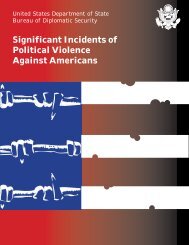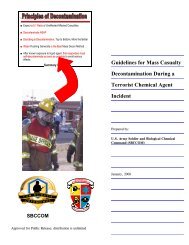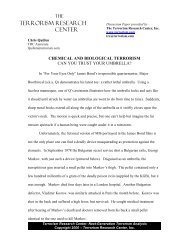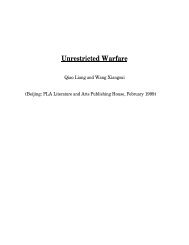Combating Proliferation of Weapons of Mass Destruction
Combating Proliferation of Weapons of Mass Destruction
Combating Proliferation of Weapons of Mass Destruction
You also want an ePaper? Increase the reach of your titles
YUMPU automatically turns print PDFs into web optimized ePapers that Google loves.
Non-proliferation and Export Control Cooperation. The Non-proliferation and ExportControl Cooperation (NEC) unit, within the Under Secretary’s <strong>of</strong>fice, develops andstrengthens foreign national export control systems to prevent terrorists and unfriendlystates acquiring nuclear, biological, and chemical weapons; missile delivery systems; andother sensitive materials. Currently, the NEC effort engages the governments <strong>of</strong> 23countries in the Baltics, Central Europe and the New Independent States (NIS). The goal<strong>of</strong> BXA’s export control cooperation mission is to foster high-level political commitment;sound legal, regulatory, and organizational infrastructures; and a cadre <strong>of</strong> capable, welltrainedgovernment <strong>of</strong>ficials to administer effective national export control systems in theNIS. The NEC strategy is to work cooperatively with foreign governments and assist themin strengthening and implementing their own export control systems.In fiscal year 1998, NEC conducted 41 technical exchanges in 23 countries. The centraltheme for these technical exchange programs was to familiarize the countries with theelements that constitute an effective export control system and assist them in developingtheir own export control systems. Toward this goal, licensing procedures and processeswere shared, preventive enforcement techniques were explained, and case studies werepresented. The need for government and industry cooperation on export control matterswas emphasized and demonstrated. NEC also presented automation program techniquesto simplify a country’s export control system.The NEC has a dedicated staff <strong>of</strong> nine individuals and draws on the skills and talents fromother units in BXA when needed, e.g., enforcement personnel for exchanges with foreignenforcement personnel. Funds for NEC’s activities are currently derived from the StateDepartment’s Nonproliferation, Antiterrorism, De-Mining and Related Activities account.However, these funds are not used to justify positions or pay government salaries. ThusBXA directly funds a small staff without a direct appropriation for this purpose. Attempts toobtain direct funding in the last two years have failed. In addition, only recently has Statechanged its policy to allow up to 4 percent <strong>of</strong> the funds to be used to cover travel by U.S.Government employees.When funds are approved by State for BXA/NEC’s activities, the timing <strong>of</strong> receipt <strong>of</strong> thefunds complicates NEC’s efforts to work with these countries. In fiscal year 1999, NEC hasestablished a goal <strong>of</strong> 45 technical exchanges, including several industry-governmentprograms. However, such industry-government programs require the development andpreparation <strong>of</strong> written internal compliance programs reflecting the host country’s laws,regulations and processes and must be translated into the country’s language. Suchprojects require a six-month lead time. However, as <strong>of</strong> April 1999, BXA had not receivedfunding for fiscal year 1999 projects. Such a delay makes it very difficult to plan a full year’sactivities.87







